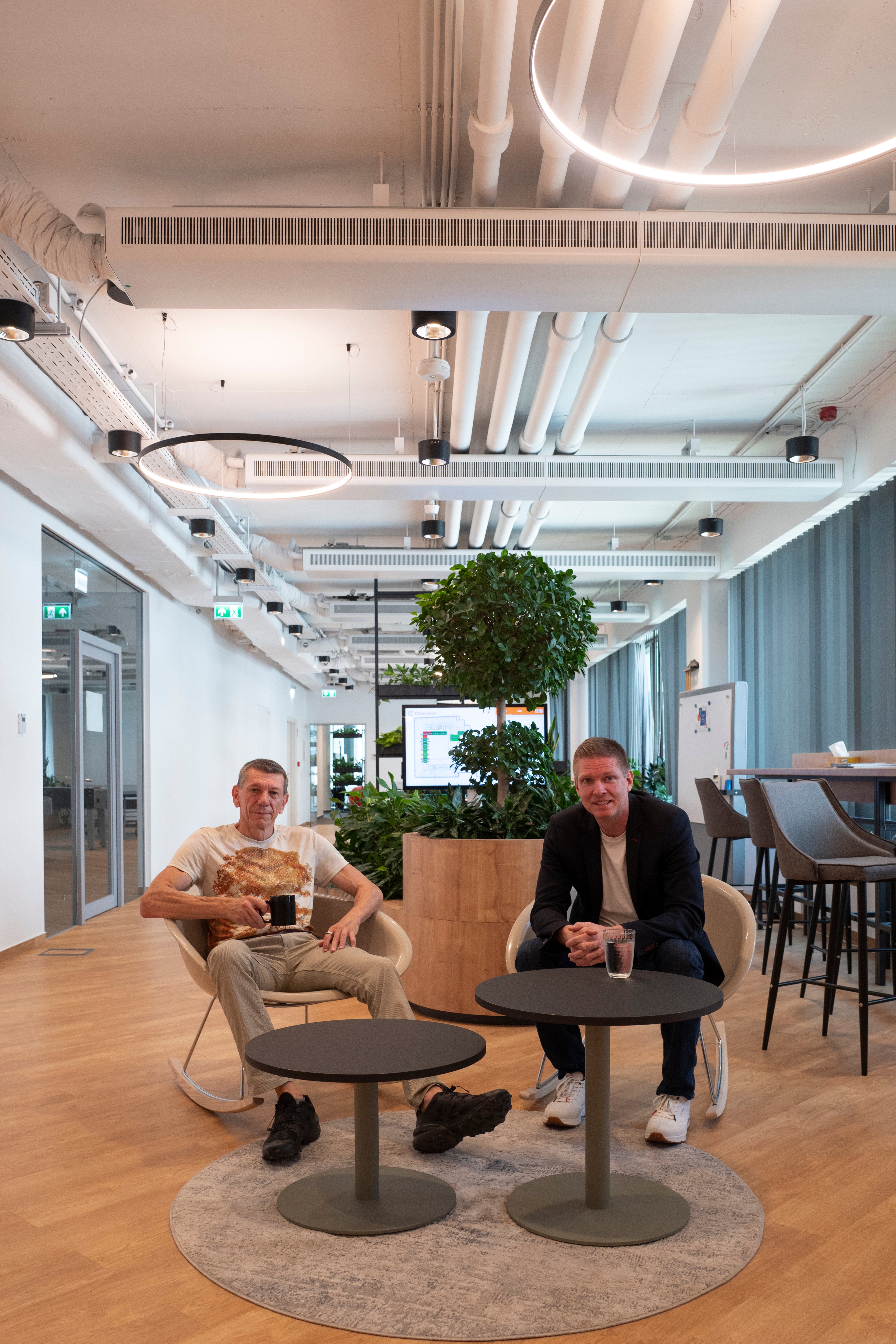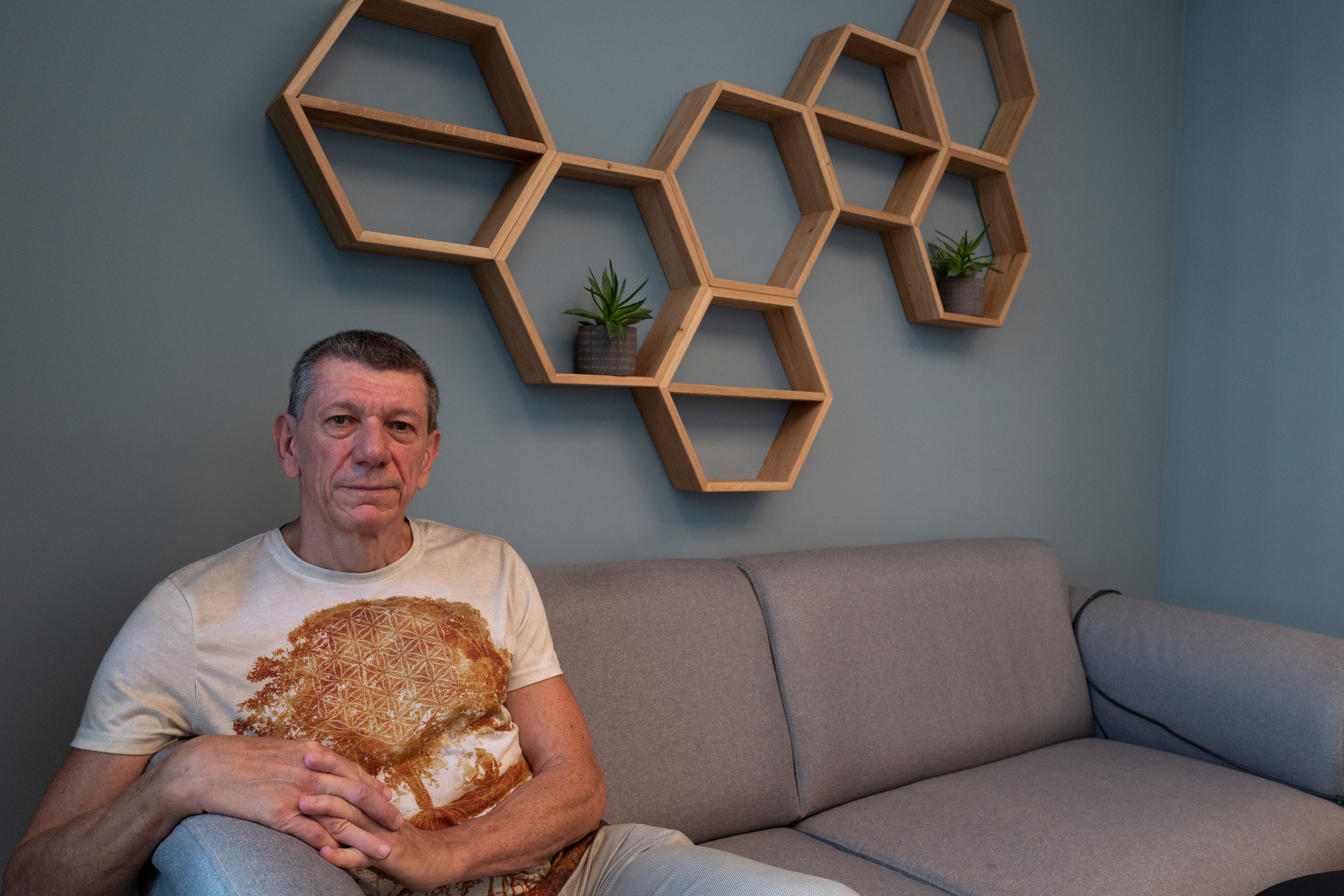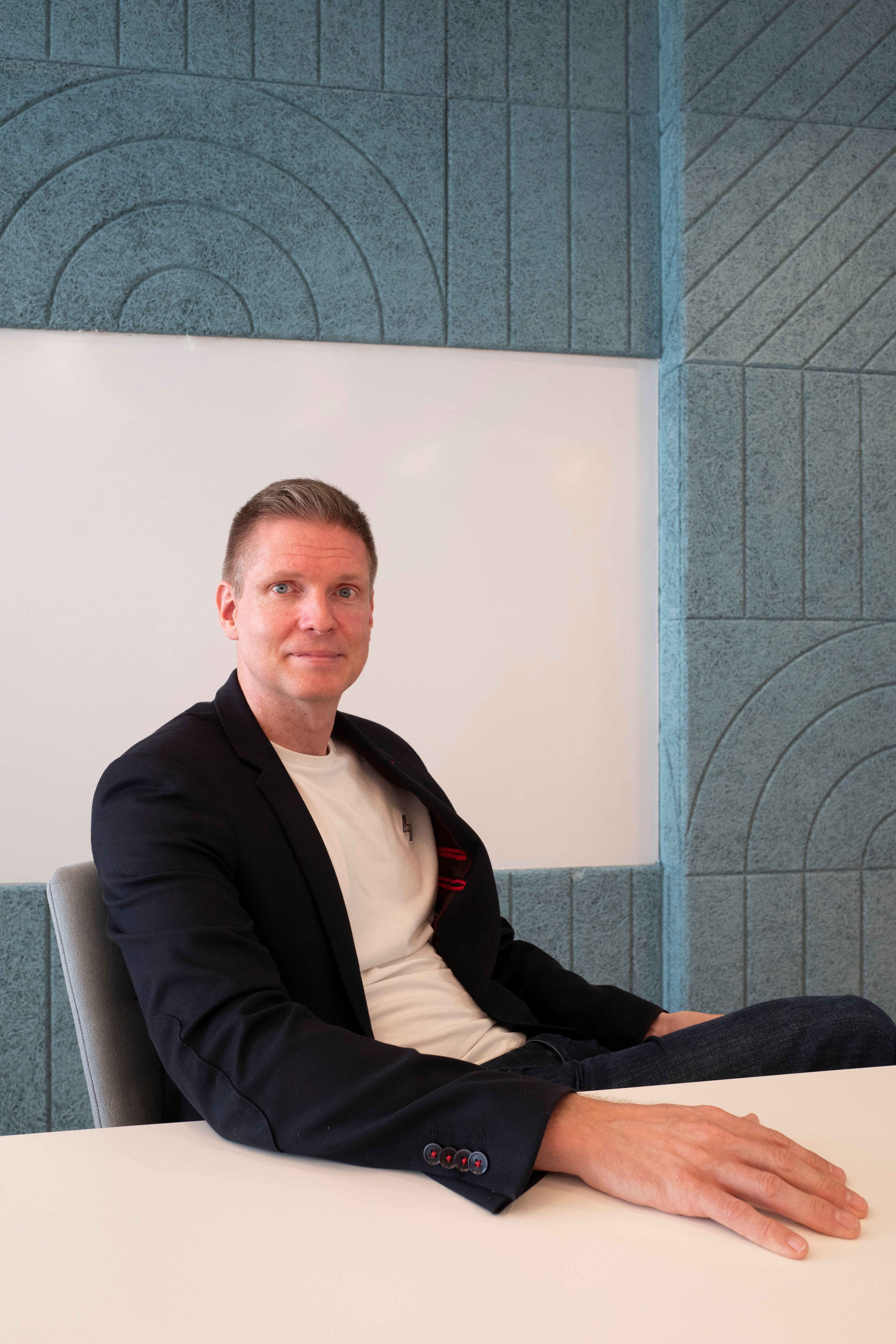"Make the company look like I won the lottery"
This article was originally published in Forbes Hungary Magazine, November 2023. Visit Publication
Chemaxon may be a lesser-known name in Hungary, but it is part of the global elite of the pharmaceutical industry, and its software is used by all the global players in pharmaceutical R&D. The company has been thriving for 25 years under the radar, until in 2022, the founder sensed that the time had come for him to step back.

“We participated in a startup program at Bayer Pharmaceuticals in 2016 when we were told that Chemaxon was a Hungarian company. I didn't understand how we didn't know about them,” says Dániel Veres, Scientific Director of Turbine AI, a company developing drugs using simulated cell models.
Chemaxon grew organically into a formidable player in the field, never raising capital. “What makes us likeable is our humility, ingenuity and openness, and It all comes from Csizi’s personality. But we should be bigger” says Richard Jones. He took over from founder Ferenc Csizmadia, or Csizi, at the beginning of 2022. From the start, they had a well-established foreign client base and now work for companies including Pfizer, AstraZeneca and Roche.
Could they be bigger? “There are 20 dominant pharmaceutical companies in the world who are their clients. There won't be a twenty-first tomorrow who can suddenly make a big splash on revenue,” says Veres of the market dynamics. New product launches are also slower in this conservative industry. Turbine is not yet using Chemaxon software “because it doesn’t have biology” but what they deliver in chemistry is amazing.
They help everywhere in the DMTA (Design-Make-Test-Analyze) cycle within the industry on the software side. In other words, if you're a chemist, you need Chemaxon.
Ferenc Csizmadia was a rebellious child. He tuned in to Radio Free Europe - his father was terrified. As an engineer in the military, he was no supporter of the system, but he preferred peace. The family raised two children in the second district of Budapest. Csizi’s mother, a teacher, worked at a family support center. Young Csizi was not particularly motivated by his studies. Always curious and open to the world, he was not always interested in what was being taught in the classroom. He studied science - first a chemical college He got a strong basis in chemistry at a chemical industrial high school, followed by a teaching degree in chemistry and mathematics. Csizi then landed a job in a lab at Chinoin, a Hungarian drug manufacturer.
This lab was where he first got access to a Commodore 64 computer. At work and in his circle of friends, several people started to teach themselves software development. In the mid-1980s, everyone was eager to learn how to create spectacular things easily on the computer. Csizi decided to enroll in university again - he studied programming at ELTE while working in the lab during the day.
At the time of the regime change in 1989, he was already working in software development.In fact, by then he had figured out the formula for Chemaxon: software development and chemistry. In the early 90s, he worked on cheminformatics at CompuDrug Chemistry, while finishing his PhD in Chemistry. In 1996, he had a research scholarship in Toronto, but missed home, so he returned after a year. Suddenly, he found himself with valuable individual knowledge but no job. He was certain of one thing: he no longer wanted to be told what to do by others.
In his early twenties, Richard Jones had a taste of India which left him 20 pounds lighter but all the more resilient to extreme circumstances. “I realized I was a real survivor, eventually I could make it anywhere.” Richard’s accent and sense of humor might be decidedly British, his life story is rather different from the average Englishman’s. Born in Trinidad and Tobago, his chemist father taught in several countries and the family traveled a lot. He studied to be a chemist, but soon realized he wanted to do more than lab work. After university, he took a job in a pharmaceutical development company and when he had enough money, he went off to see the world. That's how he ended up in India.
Perhaps it was this trip that gave him the courage to make the change. Encouraged by a Hungarian colleague, he made an unexpected gamble: he applied for a job in Budapest. He was hired. This was nineteen years ago. “Now I'm well and stuck here,” he says with a smile. It was in his second year here that he met Csizi in a bar, who was trying to poach his then-boss to work for Chemaxon.
They had a few pints and talked. “He said, ‘We need guys just like you.’ Little did I know at the time how true that statement would be seventeen years later.” The first connection in Richard and Csizi's life was actually Ferenc Darvas, a prominent entrepreneurial figure in Hungarian biotechnology. Richard spent seventeen years at his company ThalesNano, while Csizi started his career at another Darvas company, CompuDrug. In the mid-1990s, Csizi, returning from Canada, worked for Darvas, and together they founded Chemaxon in a few years. Darvas was essentially a silent partner, and after a year Csizi had bought him out.

Chemaxon continued to run as a family business, and Csizi's younger brother Péter also started working there. He was writing his thesis in physics and doing research. Programming was a hobby, but he still “worked day and night in the company.” They surrounded themselves with enthusiastic PhD students, who came to work in their spare time. In 2000, they started to turn serious profit, and they were finally able to pay decent salaries. The first customer was the University of Maryland, and they bought JChem, a tool for swift and efficient search in molecular libraries. Then, AstraZeneca signed up for the company’s flagship product, Marvin. “They were already using the software for what we had invented it for.” Marvin is now one of the most widely used chemical design softwares in the world.
“I didn't have a great understanding of the market, and that hasn't changed since. But it was clear at the time that there was a great need for a toolkit that you could integrate into your own software.” When big software vendors were still producing out-of-the-box, non-customizable products, which couldn't serve specific needs, Csizi and the newly created Chemaxon were aiming for exactly this niche.
With extensive background knowledge, they were able to understand exactly what the chemical industry and drug developers needed, and they created the right solutions for them. They delivered simple components that could be launched from a browser - meaning they were easy to integrate. In many cases, the customers told them what they wanted. “The great thing about this was that we didn't have to invent the end product.”
Naturally, product innovation has also been brought on by ideas coming from within the company. Structures drawn in Marvin appear on the screen as a graph - but that doesn't tell you anything about the physico-chemical properties of a synthesized, manufactured molecule. Chemaxon was able to give a relatively accurate estimate of these, and calculators and predictors remain an important part of the company's scientific DNA.
Companies in the pharmaceutical and chemical industries are always looking for different target molecules, and a lack of efficiency in finding the right one can cost hundreds of millions of dollars. How acidic will a molecule be? How soluble will it be in stomach acid? If the guess is right, customers will be that much closer to their end goal.
And Chemaxon's estimates were already pretty good, even back in the day.
With a solidified market position, external shocks were easily weathered. A devastating blow came from the personal side, not just for Chemaxon, but for Csizi himself. 2009 saw the biggest tragedy in Hungarian Himalayan mountaineering, with four Hungarians disappearing, likely buried under ice and rockfall in their camp. Péter Csizmadia was part of the expedition.
For many years, Chemaxon’s offices were located in a rented family house in Óbuda, where they had many good parties. As their numbers grew, they moved further into the city. The atmosphere remained familial, the organization flat. “I liked working with people whose autonomy I could trust 100 percent, with teams that were self-organizing.” So-called product owners drove projects and were given a completely free hand. Virtually every product had a life of its own. In the meantime, they opened offices in Boston, San Diego and Basel, important centers for their target markets.
At one point it was the flat organizational background that became a barrier to further growth. Csizi does not deny that he started to consciously take a step back because he no longer wanted to cope with it. “I felt that they needed a different kind of person from who I am.” The organizational transformation really started about ten years ago. In the meantime, Richard ran into Csizi from time to time, and a few years ago he approached him with a business idea. The conversation soon moved on, and it turns out Csizi was already looking for someone to take his place, partly because he was already embarking on his new love project.
Then he asked, “Richard, would you be interested in the position?” The field was the same, the job was new, and although the software/data area was relatively new for Richard, he did bring relevant experience from ThalesNano. “I thought, this must be the next logical step.” Then he adds, “statistics show that most CEOs suffer from impostor syndrome. For me, this was a big step, but I was reassured by the fact that whenever I visited Chemaxon, I always felt at ease.” Richard was appointed CEO of the company in early 2022.

Today, Chemaxon is a chemical software development company with about 250 employees, offering almost 50 products, and boasting a truly global presence. The company no longer rents office space in a family house, but has its headquarters in the office corridor on Váci út. Of course, the company breakfasts still hearken back to the days when they used to barbecue on the edge of the woods in the garden of the old “office.”
“Fake it till you make it” is how the saying goes. “I don't like that. When you pretend to be different, bigger, just to lie to sell yourself,” Richard explains. In the beginning, Chemaxon would go to customers and say “Listen, we've got some tools. We're not quite ready yet, but let's work together to make them better.” These personal relationships have established a reputation and credibility with our customers. Richard says they now need to maintain this, even while their growth objectives mean that the distance between the company and their customers will naturally increase.
“The hardest part of the job is obviously changing the organization,” says Richard. “We've moved from a company that was often too nice to customers and gave everything away.
We need to be able to achieve our major goals without changing the soul of the company.
At the same time, we're creating value here, and we need to be paid accordingly.”
With a portfolio of under 10 products, Richard's vision is to provide services, rather than point solutions, that make Chemaxon ubiquitous in the industry. All of the changes are in support of this vision. As he says, “it's easy to throw around words like ‘cloud platform’, but creating it is much harder.” After all, many people are already using and paying for existing products, and they want to level up while maintaining the company's profitability. According to a market source, they do not currently have a distinct algorithmic or data advantage over their competitors, but “if they could marry these two on a single platform, there could be great potential.”
25 years after its founding, Chemaxon began writing the next chapter. They have experienced a coming of age and remained competitive in a market where - thanks to the “free money” movement in the last ten years - their competitors have been able to grow with hundreds of millions of dollars of investments. One of Richard's key goals is to create an organization that can function without him. “I want the company to be like winning the lottery. It runs itself and is profitable.”
Another important aim is to keep the company at the forefront of innovation. In this, he feels a slight setback, as the focus has been on transforming internal processes. “What moves me is that when customers talk about Chemaxon, they get excited. We don't want to be competitive in pricing, but in innovation.” Organic growth may no longer be enough to do that. Richard is not shying away from bringing in outside capital, a sign of a new era. An intriguing question is whether they will need to open up new markets, such as biotech, to achieve more accelerated growth.
“Which day?”, says Csizi, while smiling when I ask him how many times he has been approached by parties offering to buy his company. He doesn't really care about the offers. “I'd be lying if I said I didn't think about it once, but I never sold it,” he concludes briefly. Outside sources might have come in handy to accelerate growth, but Csizi has never really felt the need to force growth. “I never became a businessman. I was never interested in EBITDA. I was always interested in being successful. Of course, part of it was the business result, but for me it was also very important how good our reputation was - that we were liked. We were good at that.”
Ancestralize
Csizi is now working on developing an app that diagnoses what a user needs to live a healthy life and what health risks they should be aware of. After a health assessment - where you can also enter symptoms - you get personalized advice to improve your health. According to Csizi, there is a lot of poor quality or misunderstood research. Molecular biologists and medical researchers are building a database to find the most likely diseases based on observed symptoms, lab results and risk factors. He currently works on this project with his wife and son.